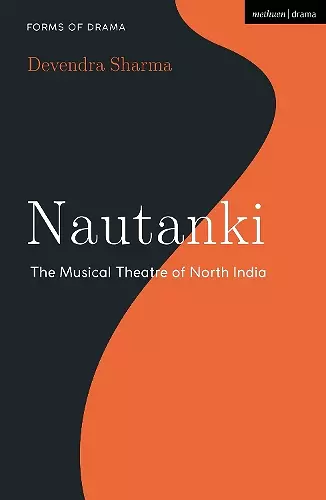Nautanki
The Musical Theatre of North India
Devendra Sharma author Simon Shepherd editor
Format:Hardback
Publisher:Bloomsbury Publishing PLC
Publishing:20th Feb '25
£65.00
This title is due to be published on 20th February, and will be despatched as soon as possible.

Exploring the history of Nautanki through both a scholarly and practitioner’s lens, this study details how the form helped give rise to and shape India’s distinctive urban theatres and cinemas such as Bollywood.
Drawing on more than 4 decades of experience working in Nautanki as a writer, director, singer, and actor, Sharma’s book is the first major study to analyse Nautanki not only through its literary bases, but also through live performances, considering it both in a historical vein and as contemporary theatre on the ground.
What entertained India’s masses and elites before the arrival of cinema in India? When did “modern” theatre begin in India and how did Nautanki contribute to its rise?
In this book, renowned theatre scholar and 7th-generation Nautanki artist Devendra Sharma examines the theatrical form of Nautanki—its history, organisational structure, narratives, poetics, musical structures, artists, and performance spaces—which flourished in North India in the 19th and the 20th centuries, and is still popular now.
In a concise format, Sharma explores how this socially and politically relevant theatre, full of beautiful music, swashbuckling heroes, magic, romance, and contemporary themes, once charmed audiences throughout India’s cities and countryside towns and served as the continuation of elements of ancient Indian theatre. This book unravels a critical shift in the history of Indian theatre, the move from unbounded performance spaces to proscenium stages in big cities, and how this changed the meaning of theatre in India. It examines how forces of globalization and modernization have profoundly changed India’s theatrical landscape, arguably side-lining one of its most robust theatre forms of the 19th and 20th centuries. It also discusses the future of Nautanki, and how it is now being performed globally. Nautanki is essential reading for anybody interested in Indian theatre, world theatre, musical theatre, opera, and Bollywood.
Devendra Sharma’s volume presents a rare combination of intimate insider and academic outsider approaches to one of the most important living theatrical traditions of India. Sharma has the unique privilege of being able to start his fieldwork at home, within the internalized tradition of an outstanding nautanki performer lineage. His lifelong cultivation of Nautanki is balanced with decades of engagement with western academia. This monograph not only presents invaluable insights into the history and working of Nautanki with close attention to its practicalities but is also a highly readable volume with evocative descriptions of Nautanki performances and of the complex emotions it raises both in the artists and the audience. * Imre Bangha, University of Oxford, UK *
Nautanki: The Musical Theatre of North India is that rare thing: an account of a once wildly popular theatre form by a contemporary performer-scholar steeped in the tradition. Devendra Sharma combines history, aesthetics, and technical exposition with a robust critique of the marginalization of popular performance as "folk". As his own work shows, nautanki is a richly expressive and pliable language that continues to speak to contemporary anxieties and desires. * Francesca Orsini, Professor Emerita, SOAS, University of London, UK *
Devendra Sharma approaches performance for social change as a scholar, a performer, and a director. He is a leading expert in Nautanki and his inquiry into its past, present, and future provides valuable insights. * Douglas Fraleigh, California State University-Fresno, USA *
Devendra Sharma has given us the first comprehensive account of Nautanki, a theatrical form that became hugely popular in northern India from the early 20th century. Himself a distinguished Nautanki performer, Sharma dispels the notion that Nautanki is a folk genre and shows in meticulous detail how an operatic form developed bridging urban and rural audiences to tackle mythological, social and political themes, employing sophisticated modes of lyrical composition, virtuoso singing and instrumental accompaniment. This is a major contribution to theatre studies in India. * Partha Chatterjee, Professor Emeritus of Anthropology, Columbia University, USA *
ISBN: 9781350296725
Dimensions: unknown
Weight: unknown
192 pages